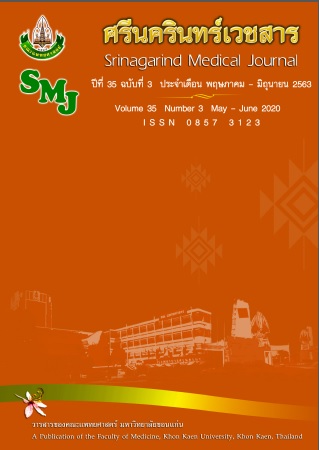Quercetin Enhances Phenformin in Inhibition of Cholangiocarcinoma Cell Growth
Keywords:
Phenformin; quercetin; myricetin; cholangiocarcinoma; mitochondrial transmembrane potentialAbstract
Background and Objective: Phenformin, and flavonoid compounds, quercetin and myricetin are effective against many types of cancers. This study evaluated the treatments of phenformin in combination with quercetin or myricetin in the inhibition of cholangiocarcinoma (CCA) cells.
Methods: Cholangiocarcinoma cells, KKU-156, were used in this study. Cell cytotoxicity was evaluated by sulforhodamine-B assay (SRB). Mitochondrial membrane potential (Dym) was analyzed by JC-1 assay.
Results: Phenformin significantly inhibited proliferation of cancer cells. Phenformin in combination with quercetin, but not myricetin, could increase the cytotoxicity of cancer cells. Phenformin, quercetin or in the combination induced the loss of mitochondrial transmembrane potential.
Conclusions: Quercetin increased phenformin in inhibition of cancer cell growth. The mechanism may be by the increase of induction of mitochondrial damage leading to cell death. This finding suggests that phenformin in combination with quercetin has potential to increase efficacy of chemotherapy of cholangiocarcinoma.
References
2. Banales JM, Cardinale V, Carpino G, Marzioni M, Andersen JB, Invernizzi P, et al. Expert consensus document: Cholangiocarcinoma: current knowledge and future perspectives consensus statement from the European Network for the Study of Cholangiocarcinoma (ENS-CCA). Nat Rev Gastroenterol Hepatol 2016; 13: 261-80.
3. Valle J, Wasan H, Palmer DH, Cunningham D, Anthoney A, Maraveyas A, et al. Cisplatin plus gemcitabine versus gemcitabine for biliary tract cancer. The New England journal of medicine 2010; 362: 1273-81.
4. Chaiteerakij R, Yang JD, Harmsen WS, Slettedahl SW, Mettler TA, Fredericksen ZS, et al. Risk factors for intrahepatic cholangiocarcinoma: association between metformin use and reduced cancer risk. Hepatology 2013; 57: 648-55.
5. Appleyard MV, Murray KE, Coates PJ, Wullschleger S, Bray SE, Kernohan NM, et al. Phenformin as prophylaxis and therapy in breast cancer xenografts. Br J Cancer 2012; 106: 1117-22.
6. Wandee J, Prawan A, Senggunprai L, Kongpetch S, Tusskorn O, Kukongviriyapan V. Metformin enhances cisplatin induced inhibition of cholangiocarcinoma cells via AMPK-mTOR pathway. Life Sci 2018; 207: 172-83.
7. Rajeshkumar NV, Yabuuchi S, Pai SG, De Oliveira E, Kamphorst JJ, Rabinowitz JD, et al. Treatment of Pancreatic Cancer Patient-Derived Xenograft Panel with Metabolic Inhibitors Reveals Efficacy of Phenformin. Clin Cancer Res 2017; 23: 5639-47.
8. Vancura A, Bu P, Bhagwat M, Zeng J, Vancurova I. Metformin as an Anticancer Agent. Trends Pharmacol Sci 2018; 39: 867-78.
9. Wang Y, Meng Y, Zhang S, Wu H, Yang D, Nie C, et al. Phenformin and metformin inhibit growth and migration of LN229 glioma cells in vitro and in vivo. Onco Targets Ther 2018;11: 6039-48.
10. Tao T, He C, Deng J, Huang Y, Su Q, Peng M, et al. A novel synthetic derivative of quercetin, 8-trifluoromethyl-3,5,7,3',4'-O-pentamethyl-quercetin, inhibits bladder cancer growth by targeting the AMPK/mTOR signaling pathway. Oncotarget 2017; 8: 71657-71.
11. Tuponchai P, Kukongviriyapan V, Prawan A, Kongpetch S, Senggunprai L. Myricetin ameliorates cytokine-induced migration and invasion of cholangiocarcinoma cells via suppression of STAT3 pathway. J Cancer Res Ther 2019; 15: 157-63.
12. Strobel P, Allard C, Perez-Acle T, Calderon R, Aldunate R, Leighton F. Myricetin, quercetin and catechin-gallate inhibit glucose uptake in isolated rat adipocytes. Biochem J 2005; 386(Pt 3): 471-8.
13. Lea MA, Pourat J, Patel R, desBordes C. Growth inhibition of colon cancer cells by compounds affecting AMPK activity. World J Gastrointest Oncol 2014; 6: 244-52.
14. Suphim B, Prawan A, Kukongviriyapan U, Kongpetch S, Buranrat B, Kukongviriyapan V. Redox modulation and human bile duct cancer inhibition by curcumin. Food Chem Toxicol 2010; 48(8-9): 2265-72.
15. Halestrap AP. What is the mitochondrial permeability transition pore? J Mol Cell Cardiol 2009;46(6):821–31.
16. Yuan P, Ito K, Perez-Lorenzo R, Del Guzzo C, Lee JH, Shen CH, et al. Phenformin enhances the therapeutic benefit of BRAF(V600E) inhibition in melanoma. Proc Natl Acad Sci U S A 2013; 110(45): 18226-31.
17. Dandapani M, Hardie DG. AMPK: opposing the metabolic changes in both tumour cells and inflammatory cells? Biochem Soc Trans 2013; 41: 687-93.
18. Kerimi A, Jailani F, Williamson G. Modulation of cellular glucose metabolism in human HepG2 cells by combinations of structurally related flavonoids. Mol Nutr Food Res 2015; 59: 894-906.
19. Bernardi P, Di Lisa F. The mitochondrial permeability transition pore: molecular nature and role as a target in cardioprotection. J Mol Cell Cardiol 2015; 78: 100-6.
20. Wandee J, Prawan A, Senggunprai L, Kongpetch S, Kukongviriyapan V. Metformin sensitizes cholangiocarcinoma cell to cisplatin-induced cytotoxicity through oxidative stress mediated mitochondrial pathway. Life Sci 2019; 217: 155-63.




